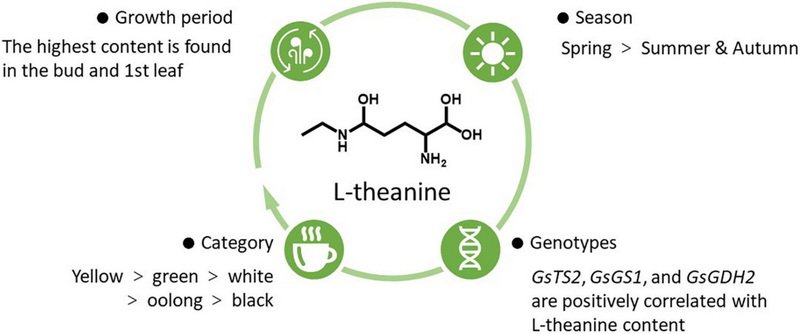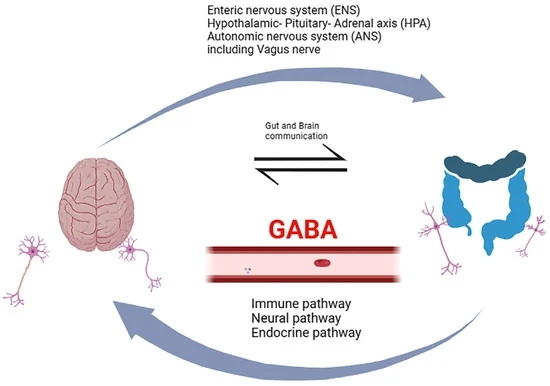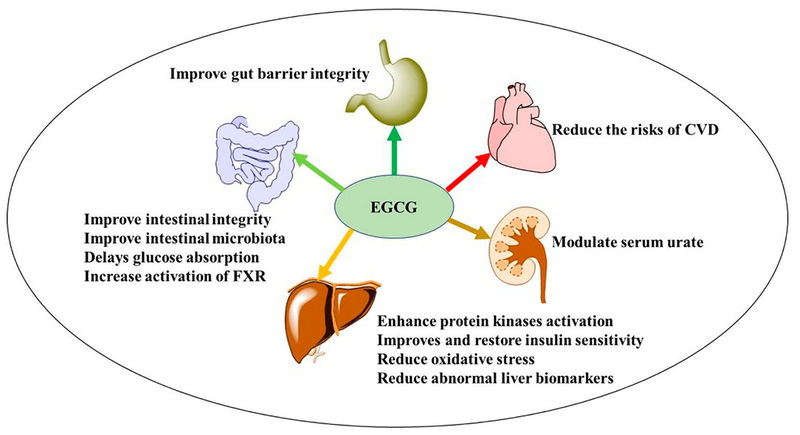Content Menu
● The Bioactive Compounds in Green Tea
● Green Tea and GABA
>> GABA Green Tea Production
>> Potential Benefits of GABA Green Tea
● Green Tea and Dopamine
>> EGCG and Dopamine
>> Caffeine and Dopamine
● Green Tea and HGH
>> Potential Mechanisms
● Dosage Considerations
>> For GABA Effects
>> For Dopamine Effects
>> For Potential HGH Effects
● Safety Considerations
● Conclusion
● FAQ
>> 1. Can green tea replace medications for depression or anxiety?
>> 2. How long does it take to see the effects of green tea on mood or cognition?
>> 3. Is it better to drink green tea or take green tea extract supplements?
>> 4. Can green tea interfere with sleep if taken late in the day?
>> 5. Are there any contraindications for taking green tea extract?
● Citations:
Green tea has long been celebrated for its numerous health benefits, including potential effects on neurotransmitters like GABA and dopamine, as well as its possible influence on human growth hormone (HGH) production. This article will explore the relationship between green tea extract and these important biochemical compounds, and provide insights into optimal dosage for potential benefits.

The Bioactive Compounds in Green Tea
Green tea is rich in various bioactive compounds, with the most notable being:
1. Catechins: Particularly epigallocatechin gallate (EGCG)
2. L-theanine
3. Caffeine
These compounds are believed to contribute to the potential effects of green tea on GABA, dopamine, and HGH levels[1][2].
Green Tea and GABA
Gamma-aminobutyric acid (GABA) is a neurotransmitter that plays a crucial role in reducing neuronal excitability throughout the nervous system. Green tea, especially when processed to increase its GABA content, may have beneficial effects on GABA levels in the brain[5].
GABA Green Tea Production
GABA green tea is produced through a special anaerobic fermentation process that increases the GABA content. This process involves exposing tea leaves to nitrogen-rich environments, which stimulates the production of GABA[5].
Potential Benefits of GABA Green Tea
Research suggests that GABA green tea may have antidepressant-like effects and could help alleviate stress and anxiety. These effects are thought to be mediated through the GABAergic neurotransmission in the cerebral cortex[5].
Green Tea and Dopamine
Dopamine is a neurotransmitter associated with motivation, pleasure, and reward. Green tea components, particularly EGCG and caffeine, may influence dopamine levels in the brain[1][3].
EGCG and Dopamine
Studies have shown that EGCG can increase synaptic dopamine by reducing dopamine reuptake[1]. This effect may contribute to the potential mood-enhancing and cognitive benefits of green tea.
Caffeine and Dopamine
Caffeine, another component of green tea, may increase dopamine release through the inhibition of adenosine receptors[9]. This mechanism could contribute to the stimulant effects of green tea.

Green Tea and HGH
Human Growth Hormone (HGH) is an important hormone for growth, cell repair, and metabolism. While direct evidence linking green tea to HGH production is limited, some of green tea's effects may indirectly influence HGH levels.
Potential Mechanisms
1. Improved sleep quality: L-theanine in green tea may promote relaxation and better sleep, which is crucial for HGH production[6].
2. Stress reduction: Green tea's calming effects may help reduce cortisol levels, potentially allowing for better HGH production[6].
Dosage Considerations
Determining the optimal dosage of green tea extract for potential GABA, dopamine, and HGH benefits can be challenging due to variations in individual physiology and the specific extract used. However, some general guidelines can be considered:
For GABA Effects
Studies on GABA green tea have used doses ranging from 100-300 mg of GABA per day[5]. However, it's important to note that regular green tea typically contains much lower amounts of GABA.
For Dopamine Effects
Research on the effects of green tea catechins on dopamine has often used doses equivalent to 5-10 cups of green tea per day[1][3]. In extract form, this might translate to 250-500 mg of green tea extract, standardized to contain at least 50% EGCG.
For Potential HGH Effects
As there's no direct evidence linking green tea to HGH production, no specific dosage can be recommended for this purpose. However, consuming 3-5 cups of green tea per day (or equivalent in extract form) is generally considered safe and potentially beneficial for overall health[6].
Safety Considerations
While green tea is generally considered safe, high doses of green tea extract may cause side effects in some individuals. These can include:
1. Caffeine-related side effects (jitters, insomnia)
2. Digestive issues
3. Potential liver toxicity (rare, but reported with very high doses)
It's always advisable to consult with a healthcare professional before starting any new supplement regimen, especially if you have pre-existing health conditions or are taking medications.
Conclusion
Green tea extract shows promise in potentially influencing GABA and dopamine levels, with possible indirect effects on HGH. While specific dosage recommendations for these effects are challenging to establish, moderate consumption of green tea or its extract (equivalent to 3-5 cups per day) appears to be safe and potentially beneficial for most individuals. However, more research is needed to fully understand the optimal dosage and long-term effects of green tea extract on these biochemical compounds.

FAQ
1. Can green tea replace medications for depression or anxiety?
Green tea should not be considered a replacement for prescribed medications. While it may have some mood-enhancing effects, it's important to consult with a healthcare professional for the treatment of depression or anxiety.
2. How long does it take to see the effects of green tea on mood or cognition?
The effects of green tea on mood and cognition can vary between individuals. Some people may notice acute effects within hours of consumption, while others may require consistent intake over weeks or months to observe noticeable changes.
3. Is it better to drink green tea or take green tea extract supplements?
Both forms can be beneficial. Drinking green tea provides a more natural and balanced intake of compounds, while supplements can offer a more concentrated dose. The choice depends on personal preference and specific health goals.
4. Can green tea interfere with sleep if taken late in the day?
Yes, due to its caffeine content, consuming green tea or its extract late in the day may interfere with sleep for some individuals. It's generally recommended to avoid caffeine intake in the hours leading up to bedtime.
5. Are there any contraindications for taking green tea extract?
Green tea extract may interact with certain medications and may not be suitable for individuals with certain health conditions. It's important to consult with a healthcare provider before starting any new supplement regimen, especially if you have pre-existing health issues or are taking medications.
Citations:
[1] https://pmc.ncbi.nlm.nih.gov/articles/PMC8830767/
[2] https://www.frontiersin.org/journals/neuroergonomics/articles/10.3389/fnrgo.2023.1136362/full
[3] https://www.biorxiv.org/content/10.1101/2021.04.26.441489v1.full
[4] https://www.youtube.com/watch?v=mpIJOavyYtQ
[5] https://pubs.rsc.org/en/content/articlelanding/2017/fo/c7fo01045a
[6] https://pubmed.ncbi.nlm.nih.gov/28056735/
[7] https://www.healthline.com/nutrition/dopamine-supplements
[8] https://www.tiprpress.com/ywpjyj/article/pdf/20211226?file_name=B3147901C258E4906B492BA210E8E029D066D7E3AD76D56B0BFA74F1B4E7AC3BE05483707C8968B3D90F3BF39AA09C180EBB849988D3D50E2F7373E32FD3F2CB&open_type=self
[9] https://pmc.ncbi.nlm.nih.gov/articles/PMC9921318/






























